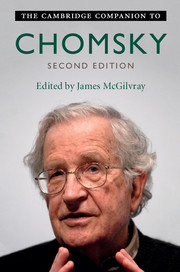66 results
Noam Chomsky Reflections on Language. New York: Random House, 1975. 269 pp.
-
- Journal:
- Canadian Journal of Philosophy / Volume 9 / Issue 3 / September 1979
- Published online by Cambridge University Press:
- 01 January 2020, pp. 519-544
-
- Article
- Export citation
Copyright page
-
- Book:
- The Cambridge Companion to Chomsky
- Published online:
- 13 July 2017
- Print publication:
- 13 April 2017, pp iv-iv
-
- Chapter
- Export citation
Dedication
-
- Book:
- The Cambridge Companion to Chomsky
- Published online:
- 13 July 2017
- Print publication:
- 13 April 2017, pp v-vi
-
- Chapter
- Export citation
Contents
-
- Book:
- The Cambridge Companion to Chomsky
- Published online:
- 13 July 2017
- Print publication:
- 13 April 2017, pp vii-viii
-
- Chapter
- Export citation
Part III - Chomsky on Politics and Economics
-
- Book:
- The Cambridge Companion to Chomsky
- Published online:
- 13 July 2017
- Print publication:
- 13 April 2017, pp 255-330
-
- Chapter
- Export citation
8 - Cognitive Science: What Should It Be?
- from Part II - The Human Mind and Its Study
-
-
- Book:
- The Cambridge Companion to Chomsky
- Published online:
- 13 July 2017
- Print publication:
- 13 April 2017, pp 175-195
-
- Chapter
- Export citation
Index
-
- Book:
- The Cambridge Companion to Chomsky
- Published online:
- 13 July 2017
- Print publication:
- 13 April 2017, pp 331-342
-
- Chapter
- Export citation

The Cambridge Companion to Chomsky
-
- Published online:
- 13 July 2017
- Print publication:
- 13 April 2017
Introduction
-
- Book:
- The Cambridge Companion to Chomsky
- Published online:
- 13 July 2017
- Print publication:
- 13 April 2017, pp 1-26
-
- Chapter
- Export citation
Contributors
-
- Book:
- The Cambridge Companion to Chomsky
- Published online:
- 13 July 2017
- Print publication:
- 13 April 2017, pp x-xii
-
- Chapter
- Export citation
Figures
-
- Book:
- The Cambridge Companion to Chomsky
- Published online:
- 13 July 2017
- Print publication:
- 13 April 2017, pp ix-ix
-
- Chapter
- Export citation
Part II - The Human Mind and Its Study
-
- Book:
- The Cambridge Companion to Chomsky
- Published online:
- 13 July 2017
- Print publication:
- 13 April 2017, pp 153-254
-
- Chapter
- Export citation
Part I - The Science of Language: Recent Change and Progress
-
- Book:
- The Cambridge Companion to Chomsky
- Published online:
- 13 July 2017
- Print publication:
- 13 April 2017, pp 27-152
-
- Chapter
- Export citation
Contributors
-
-
- Book:
- The Cambridge Handbook of Biolinguistics
- Published online:
- 05 May 2013
- Print publication:
- 14 February 2013, pp xiii-xiv
-
- Chapter
- Export citation
4 - The philosophical foundations of biolinguistics
-
-
- Book:
- The Cambridge Handbook of Biolinguistics
- Published online:
- 05 May 2013
- Print publication:
- 14 February 2013, pp 22-46
-
- Chapter
- Export citation
20 - Language, agency, common sense, and science
- from Part II - Human nature and its study
-
- Book:
- The Science of Language
- Published online:
- 05 June 2012
- Print publication:
- 15 March 2012, pp 124-128
-
- Chapter
- Export citation
8 - Perfection and design (interview 20 January 2009)
- from Part I - The science of language and mind
-
- Book:
- The Science of Language
- Published online:
- 05 June 2012
- Print publication:
- 15 March 2012, pp 50-58
-
- Chapter
- Export citation
2 - On a formal theory of language and its accommodation to biology; the distinctive nature of human concepts
- from Part I - The science of language and mind
-
- Book:
- The Science of Language
- Published online:
- 05 June 2012
- Print publication:
- 15 March 2012, pp 21-30
-
- Chapter
- Export citation
Frontmatter
-
- Book:
- The Science of Language
- Published online:
- 05 June 2012
- Print publication:
- 15 March 2012, pp i-iv
-
- Chapter
- Export citation
23 - Epistemology and biological limits
- from Part II - Human nature and its study
-
- Book:
- The Science of Language
- Published online:
- 05 June 2012
- Print publication:
- 15 March 2012, pp 133-137
-
- Chapter
- Export citation



